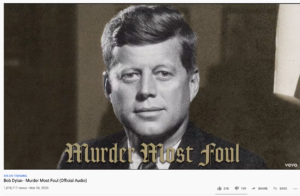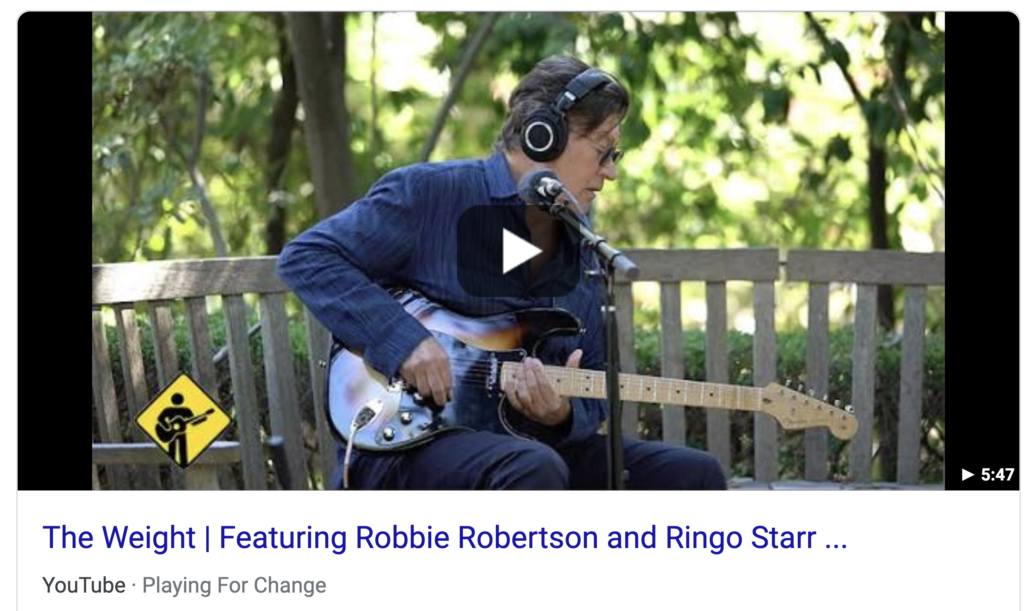Music filled my socially-distanced hours yesterday, which was good. Two very different songs, both from aging masters who’ve been crooning a soundtrack to my life for decades. They could not have been more different.

Bob Dylan’s new seventeen-minutes of melancholy and bitter wistfulness has a title from Hamlet, “Murder Most Foul.” It circles around the assassination of President John F. Kennedy in 1963, and meanders with typical Bob-mania into, through, and around a psychohistory of America in rhymed couplets that drop one after the other, sometimes doggerel but at other times hitting true, with Dylan’s distinctive off-kilter slice —
The day that they killed him, someone said to me, “Son
The age of the Antichrist has only begun.”
Air Force One coming in through the gate
Johnson sworn in at 2:38
Let me know when you decide to thrown in the towel
It is what it is, and it’s murder most foul
The other song I listened to a few times yesterday turns out, upon inspection, to be a 2019 recording of Robbie Robertson, Ringo Starr, and an all-star international cast performing a gorgeous, uplifting rendition of The Band’s old standard, “The Weight.”

Which one’s the right one to put on repeat right now?
It’s hard not to love the Robertson/Starr ensemble’s gorgeousness, put together by Playing for Change, an international collaboration dedicated to using music to advocate for peace. The YouTube splices together musicians from many beautiful places in the world, from Jamaica to Los Angeles to Africa, Bahrain, and a close-up of what looks like my long-ago haunts of Venice Beach in California. It’s a wonderfully uplifting recanting of this great old tune, and I have every intention of listening to it many more times. I might even chase down each of the individual artists.
Dylan’s project is harsher and darker. Inhabiting the role of JFK himself, he ventriloquizes something like the shock of the modern. He name-checks lots of old time rockers and pop stars, from the Kingston Trio to The Eagles, Jelly Roll Morton, and “the great Bud Powell.” His gravel-voice sounds sad, smooth, nostalgic. He tells an old story, about possible futures lost:

Tommy, can you hear me? I’m the Acid Queen
I’m riding in a long, black limousine
Riding in the backseat next to my wife
Heading straight on into the afterlife
I’ve been through the 17 minutes about a half-dozen times now. My first thought was that the song was a semi-reprise or extension of his great song “Tempest,” from his 2012 album of the same name, which narrated a fantasia of the sinking of the Titanic in thirteen minutes of dirge-like waltz. It’s an old habit or maybe intentional practice of Bob’s to leave some songs off an album, including great songs like “Caribbean Wind” (left off Shot of Love) and “Blind Willie McTell” (left off Infidels).
The timing seems acute. “Murder Most Foul” pours into our ears a dark vision of a crisis past, dropped by our living Nobelista during a present crisis. Is November 1963 when it all started to go sideways? The song concludes with a long, patient, insistant litany of songs to play, from “Misty” and “Old Devil Moon” to, last of all, “Murder Most Foul” itself. Are we meant to find the melancholy sad clarity that sometimes can beaccompanied by art, a way of looking at the nightmares of history without looking away. It’s a hard vision that the singer puts in front of us:
Freedom, oh freedom. Freedom from need
I hate to tell you, mister, but only dead men are free
There’s also a lot of Shakespeare to chew on, from the title, which quotes the Ghost of the dead King (Hamlet 1.5) to call outs to both “Merchant of Venice” and “Lady Macbeth.” Should this go on my summer syllabus? If my course runs?
There’s an ice-hard clarity and even just a glimmer of joy in full-throated tragedy, in leaning in to the crisis and refusing to avert your eyes. Each time I listen to Bob’s latest, it sounds warmer, more human, more capacious. It’s good to hear from our artists in dark times.
“Shut your mouth,” said the wise old owl
Business is business, and it’s a murder most foul.